NRA and Gun Rights Groups Oppose Potential Restrictions on Transgender Gun Ownership
In a firm response to reports of possible Trump administration measures restricting transgender Americans’ ability to purchase firearms, the National Rifle Association (NRA) has publicly reaffirmed its commitment to protecting Second Amendment rights for all law-abiding citizens. This declaration comes amid news that Department of Justice officials have been holding internal discussions about potential firearm restrictions on transgender individuals following the Annunciation School shooting by Robin Westman, who identified as transgender and legally purchased the weapons used in an attack that killed two people and injured 18 others. The NRA’s position reflects broader concerns within gun rights organizations about any policies that might create precedents for restricting constitutional rights without due process.
“The NRA supports the Second Amendment rights of all law-abiding Americans to purchase and use firearms,” stated the organization, which claims five million members nationwide. They further emphasized their opposition to “any policy proposals that implement sweeping gun bans that arbitrarily strip law-abiding citizens of their Second Amendment rights without due process.” Other major gun rights organizations have joined this stance, with Gun Owners of America (GOA) taking an equally uncompromising position, declaring they “oppose any and all gun bans. Full stop.” The organization’s senior vice president, Erich Pratt, reinforced this message by stating that GOA “does not compromise with our support for the right of all People to keep and bear arms.” Similarly, Dudley Brown, president of the National Association for Gun Rights, expressed concern that labeling people “mentally defective” to remove their gun rights would constitute a due process violation.
According to sources familiar with the discussions, Department of Justice officials are in early-stage conversations exploring legal frameworks that might restrict transgender individuals from purchasing firearms. These discussions reportedly involve the Office of Legal Counsel, which provides legal guidance to the executive branch, and would likely include input from the Bureau of Alcohol, Tobacco, Firearms and Explosives (ATF), which oversees federal firearms regulations. Some sources indicated the talks are focused on what officials describe as a “pattern” of shootings by transgender individuals, referencing not only the Westman case but also incidents like Audrey “Aiden” Hale’s attack at The Covenant School in Nashville in 2023, which left six dead, and Alec McKinney’s involvement in the STEM School shooting in Colorado where one person died and eight others were wounded.
When approached for comment, a DOJ spokesperson downplayed the specificity of these discussions, stating the department “is actively evaluating options to prevent the pattern of violence we have seen from individuals with specific mental health challenges and substance abuse disorders,” while emphasizing that “no specific criminal justice proposals have been advanced at this time.” One source clarified that officials “are reviewing ways to ensure that mentally ill individuals suffering from gender dysphoria are unable to obtain firearms while they are unstable and unwell.” This framing connects the potential restrictions to mental health concerns rather than transgender identity itself, though critics argue this association stigmatizes transgender individuals by suggesting gender dysphoria inherently compromises mental stability.
Current law doesn’t generally ban people with mental health conditions from purchasing firearms, a position recently reaffirmed by the Supreme Court in United States v. Rahimi. However, individuals deemed mentally incompetent by a court are typically flagged during background checks, potentially preventing them from obtaining gun licenses. LGBTQ advocacy organizations have strongly condemned the idea of targeting transgender people specifically, with GLAAD pointing out that “transgender people are less than 2 percent of the overall population, yet four times as likely to be victims of crime.” The organization emphasized that “everyone deserves to be themselves, be safe, and be free from violence and discrimination,” calling for leadership that prioritizes safety and freedom for all citizens.
These discussions about potential firearm restrictions align with several other policy changes affecting transgender Americans since President Donald Trump returned to office. His administration has already removed transgender individuals from military service, eliminated mentions of transgender people from some federal websites, and attempted to prevent changes to sex markers on passports. The administration has also opposed allowing transgender women to compete in women’s sports categories and has worked to limit access to gender-affirming healthcare. This context has heightened concerns among LGBTQ advocates that potential gun restrictions could represent another targeted policy rather than a good-faith effort to address gun violence.
The debate highlights the complex intersection of Second Amendment rights, mental health considerations, and protections for minority groups. Gun rights organizations view any restriction based on identity rather than individual behavior as a dangerous precedent that could undermine constitutional protections, while transgender rights advocates see such proposals as potentially discriminatory policies that further stigmatize an already vulnerable community. As discussions continue within the Department of Justice, the strong opposition from major gun rights organizations like the NRA suggests any attempt to implement such restrictions would face significant political and potentially legal challenges, reinforcing the contentious nature of both gun regulation and transgender rights in American politics.


